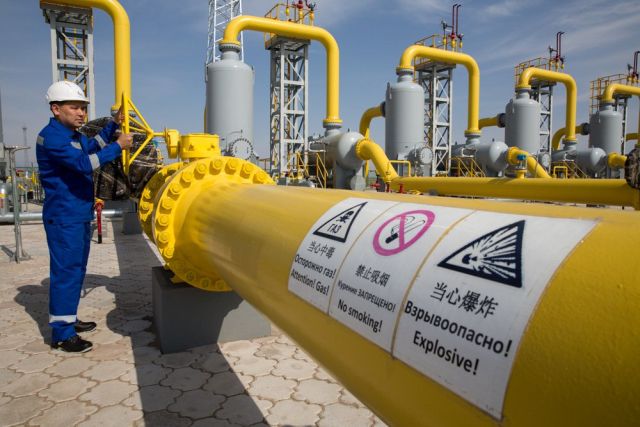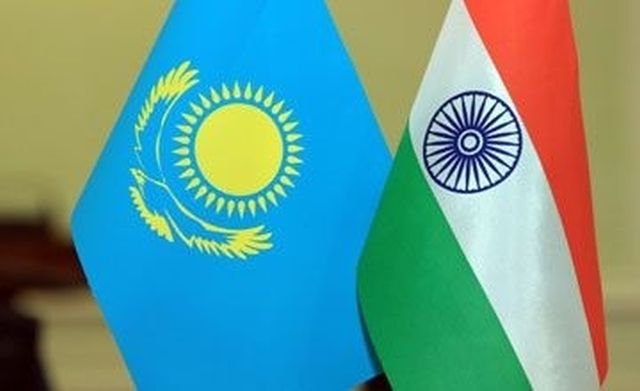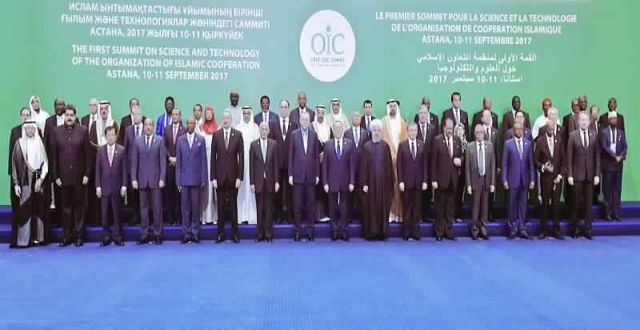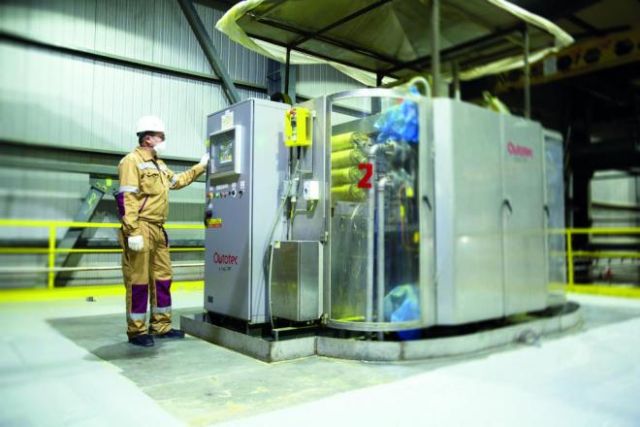
by admin | May 25, 2021 | Business, Large Enterprise, World
 Astana : Kazakhstan has signed a trade agreement with China covering exports of 5 billion cubic meters of natural gas to the Asian giant for a year, a deal that is expected to generate $1 billion in earnings for the Central Asian country, JSC KazTransGas said Tuesday.
Astana : Kazakhstan has signed a trade agreement with China covering exports of 5 billion cubic meters of natural gas to the Asian giant for a year, a deal that is expected to generate $1 billion in earnings for the Central Asian country, JSC KazTransGas said Tuesday.
“The contract was signed by JSC KazTransGas and PetroChina International Company Limited on September 30 in Beijing. Gas export deliveries are scheduled to begin on October 15,” the Kazakh company’s press service said in a statement, reports Efe.
“Expected export earnings will be around $1 billion,” JSC KazTransGas said.
The natural gas will come from fields in western Kazakhstan, as well as reserves at JSC KazMunayGas’s underground storage facilities.
China will take delivery of the gas via the Khorgos border point, the most important trade frontier between the countries.
“The diversification of transit and export routes for gas transportation in Kazakhstan, as well as the increase in the volume of natural gas exports, are important strategic objectives for the country,” JSC KazMunayGas vice president of transportation and gas trading Kairat Sharipbayev said.
Exports of Kazakh gas to China are aimed at promoting beneficial bilateral relations focused on creating a common infrastructure and establishing trade and transport links in the Eurasian region, the statement said.
The agreement also calls for bolstering bilateral strategic energy relations, as indicated by the production of 25 per cent of Kazakh oil by Chinese companies.
—IANS

by admin | May 25, 2021 | Corporate, Corporate Governance, News
 New Delhi : India and Kazakhstan on Wednesday discussed expanding cooperation in hydrocarbons and nuclear energy sectors, as well as expanding the International North-South Transport Corridor by linking it to the Kazakhstan-Turkmenistan-Iran rail link, an official statement said here on Wednesday.
New Delhi : India and Kazakhstan on Wednesday discussed expanding cooperation in hydrocarbons and nuclear energy sectors, as well as expanding the International North-South Transport Corridor by linking it to the Kazakhstan-Turkmenistan-Iran rail link, an official statement said here on Wednesday.
These and other issues figured at the two-day meeting of the Inter-Governmental Commission (IGC) with Kazakhstan, co-chaired by Petroleum Minister Dharmendra that ended on Wednesday in the central Asian nation’s capital at Astana, an Indian Petroleum Ministry release said.
The Kazakhstan delegation to the talks was led by its Energy Minister Kanat Bozumbayev.
The two sides discussed “ideas for stepping up the cooperation in energy sector, trade, economic, investment, transport and connectivity, agriculture, information technology, space, healthcare and cultural spheres between the two countries,” the statement said.
“Both leaders agreed to collaborate in the oil and gas sector for mutual benefit and further strengthen the engagement by addressing issues of concerns to Indian investors, particularly in Kazakh hydrocarbon sector,” it said.
“They explored possibility of expanding the International North-South Transport Corridor (INSTC) by linking it to the Kazakhstan-Turkmenistan-Iran rail link,” it added.
This transport corridor is a 7,200 km multi-mode network of ship, rail and road for transporting cargo between India, Russia, Iran, Europe and Central Asia. It mainly involves moving freight from India, Iran, Azerbaijan and Russia via this network.
“Kazakhstan is strategically located between Europe and Asia and offers enormous business opportunities for investments. The country is rich in mineral resources, such as uranium, oil and natural gas,” the statement said.
Bozumbayev invited Indian investments in various sectors, especially in hydrocarbons, infrastructure, nuclear energy, co-production of films, food processing and information technology, it added.
Pradhan was accompanied by a delegation of officials from various ministries, the Railway Board and the state-run oil explorer’s foreign arm ONGC Videsh Ltd.
—IANS

by admin | May 25, 2021 | Business Summit, Events, Investing, Markets, Muslim World, Technology
 Astana : Heads of state and government of the Organization of Islamic Cooperation (OIC) stressed the need to increase investment in science, technology and innovation, pointing out that the transfer of science and technology is one of the main ways to accelerate the economic development of developing countries.
Astana : Heads of state and government of the Organization of Islamic Cooperation (OIC) stressed the need to increase investment in science, technology and innovation, pointing out that the transfer of science and technology is one of the main ways to accelerate the economic development of developing countries.
In their final communique issued Monday at the conclusion of the First Islamic Science and Technology Summit hosted by the OIC in the Kazakh capital of Astana on September 10-11, leaders of the OIC member states emphasized their determination to eradicate extreme poverty from their societies, including intellectual poverty.
They reaffirmed their commitment to the principles and objectives enshrined in the OIC Charter, particularly advancing the acquisition and popularization of knowledge in consonance with the lofty ideals of Islam to achieve intellectual excellence; and enhancing and developing science and technology and encouraging research and cooperation among the member states in these fields.
The leaders expressed their resolve to reach the goals of OIC Science and Technology Agenda 2026 through a focused series of initiatives and programs in education, skills development, basic and applied sciences and big science which will be implemented through multinational and multi-institutional stakeholders in the member states.
Also in their communique, they encourage the member states to make universities and other institutions of higher education, particularly scientific research institutions, as centers of excellence so that they can play an effective role in developing within the society a culture of inquiry, intellectual pursuit and merit.
The leaders agreed among themselves to individually and collectively pursue cooperation among their countries for the sustainable development of their peoples and to confront the societal challenges of the 21st Century.
They further reaffirmed their commitment to increase the allocation of funding for the development of education, science, health and water to achieve the goals set forth in OIC 2025 Plan of Action and the United Nations Sustainable Development Goals (SDGs 2030).
They urged the member states to develop a joint policy framework to facilitate movement and employment of professionals, mutual recognition of diplomas, the inflow of new technologies and projects. In this regard, the leaders welcomed the initiative of Kazakhstan’s President, entitled “The Islamic Infrastructure Integration”, aimed at ensuring the integration of infrastructure in the field of transport, energy, trade and investment.
The communique called on the OIC member states to actively promote and support collaborative research programs in the field of agriculture, food security, conservation of eco-systems, including the fight against drought, desertification, effective management of water resources and others. It also called for reviewing the security of digital content by examining and harmonizing existing laws, policies and response related to cyber-security in the member states, keeping in mind its profound implications for all affairs of state and the emergence of meta-data.
The leaders expressed appreciation for the launching of the Science, Technology and Innovation Fund by the Islamic Development Bank (IDB) Group. which will significantly contribute to implementing the OIC Agenda 2026 on science, technology and innovation as well as addressing the development needs of the OIC countries. Therefore, they called upon the member states to contribute to the Fund.
In the communique, the leaders welcomed the offer of the government of Uzbekistan to host the 2nd OIC Summit on Science and Technology. They mandated the OIC General Secretariat and the Standing Committee on Scientific and Technological Cooperation (COMSTECH) to work with the Uzbek government to make necessary preparations for the convening of the next OIC Summit on Science and Technology in Uzbekistan.
—AB/IINA

by admin | May 25, 2021 | Muslim World
 Astana : Kazakhstan on Tuesday called on the signatories to the Comprehensive Nuclear-Test-Ban Treaty (CTBT) to make every effort to get the agreement into force.
Astana : Kazakhstan on Tuesday called on the signatories to the Comprehensive Nuclear-Test-Ban Treaty (CTBT) to make every effort to get the agreement into force.
“We urge those states that have not yet signed or ratified the treaty to do so without delay,” Kazakh Foreign Minister Kairat Abdrakhmanov and CTBTO Executive Secretary Lassina Zerbo said in a joint statement in Astana, reports Efe.
“It is high time to bring the CTBT into force. We owe it to ourselves and to future generations,” the officials said.
The CTBT was approved by the UN General Assembly in 1996 and aims to ban all nuclear tests under any circumstances.
To date, the agreement has been signed by 183 nations and ratified by 164, but it will not come into force until the United States, China, Egypt, Israel, Iran, India, Pakistan and North Korea support it.
On December 6, 2006, the UN General Assembly adopted a resolution highlighting the need to sign and ratify the CTBT. This resolution was supported by 172 countries with only two voting against – the US and North Korea.
—IANS

by admin | May 25, 2021 | World
 Vienna : Ensuring the supply of nuclear fuel in the event of disruption due to political or market problems is the objective of the International Atomic Energy Agency’s Low Enriched Uranium Bank, which opens this week in Kazakhstan.
Vienna : Ensuring the supply of nuclear fuel in the event of disruption due to political or market problems is the objective of the International Atomic Energy Agency’s Low Enriched Uranium Bank, which opens this week in Kazakhstan.
The reserve, scheduled to open on Tuesday, will store 90 tons of low-enriched uranium (LEU), the essential ingredient needed to make the fuel for light-water nuclear reactors, which generate electricity, Efe reported.
This material is usually purchased on the open market or by bilateral agreement between countries, a system the new bank does not want to disrupt.
The IAEA insists that the reserve is a “mechanism of last resort” for situations in which a UN member nation cannot access fuel by the usual means.
In fact, 90 tons represents a rather small quantity in relation to world consumption, although it would be enough to fully load a light-water reactor capable of supplying electricity to a large city for three years.
The IAEA, which manages the reserve, has established a series of strict criteria for a member state to request and purchase uranium from the bank.
First, there must be a disruption in supply “due to extraordinary circumstances” that would render the country in question unable to obtain fuel by the usual means.
In addition, the IAEA must have certified that nuclear material has not been diverted by the country in the past and that the country complies with all safety measures.
The buying country must commit to using uranium only to produce fuel, never for weapons, and not to enrich it or transfer it to third parties without the express consent of the IAEA.
If these conditions are met and the uranium is purchased at the prevailing market price, the material will be introduced into special cylinders and transferred from northern Kazakhstan, where the bank is located, to a facility where LEU can be converted into fuel.
To ensure transport, the IAEA signed an agreement with Russia in 2015 to allow the material to travel through the country.
The bank has been established at the Ulba metallurgical plant in northern Kazakhstan, and authorities are responsible for the security of the facility, even though management is the responsibility of the IAEA.
“The fuel bank is an excellent idea,” Austrian Defence Ministry adviser and University of Vienna Political Science Professor Heinz Gartner told Efe.
Gartner believes the bank ensures the peaceful use of atomic energy without the need to develop a costly enrichment program. In addition, he says, it reduces the dependency that countries without nuclear weapons have on the market.
“In both cases, the fuel bank is a reassurance, when suppliers on the international markets manipulate prices or when LEU ceases to be supplied for political reasons, for example with sanctions,” explains Gartner.
Regarding locating the bank in Kazakhstan, Gartner points out that the country is the key member of the Central Asian Nuclear Weapons Free Zone, established to reduce the risk of an atomic attack, and this could also contribute to countries like Mongolia and Iran joining the agreement.
According to the IAEA, the Ulba plant “is a nuclear facility with commercial scale operations and complete infrastructure to store, transport and process LEU safely.”
The $150 million budgeted to operate the bank over its first 10 years come from voluntary contributions. The main contributors are entrepreneur Warren Buffet ($50 million), the United States ($49 million) and the European Union (25 million euros.)
The IAEA also manages 123 tons of uranium in the Russian city of Angarsk, through an agreement with the Russian government, and participates in a mechanism led by the United Kingdom to ensure that nuclear fuel supplies are not interrupted between supplier and recipient countries.
The United States has its own nuclear fuel reserve.
—IANS

 Astana : Kazakhstan has signed a trade agreement with China covering exports of 5 billion cubic meters of natural gas to the Asian giant for a year, a deal that is expected to generate $1 billion in earnings for the Central Asian country, JSC KazTransGas said Tuesday.
Astana : Kazakhstan has signed a trade agreement with China covering exports of 5 billion cubic meters of natural gas to the Asian giant for a year, a deal that is expected to generate $1 billion in earnings for the Central Asian country, JSC KazTransGas said Tuesday.



